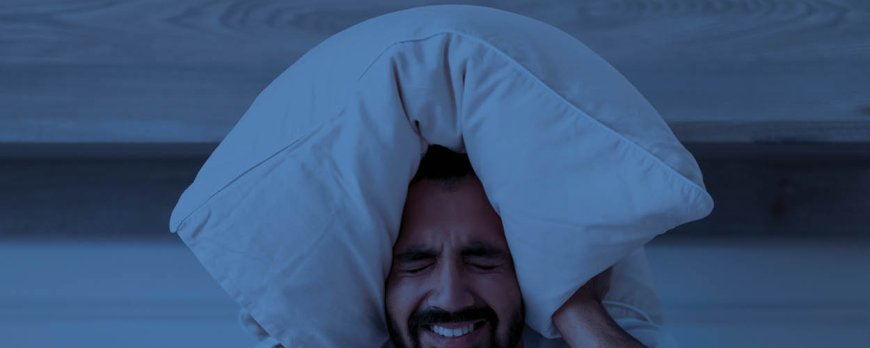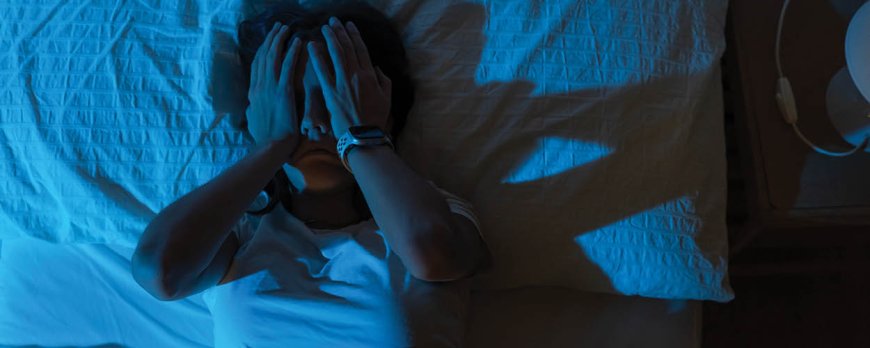Why do scary dreams wake you up?
Explore the mysteries of the mind in our detailed look into 'Why do scary dreams wake you up?' Understand the science behind frightful nightmares and their effects.

Why do scary dreams wake you up?
Scary dreams, also known as nightmares, have the ability to jolt us awake in the middle of the night, leaving us feeling unsettled and anxious. These vivid and disturbing dreams often occur during rapid eye movement (REM) sleep, which is the stage of sleep characterized by heightened brain activity. Nightmares tend to happen more frequently in the second half of the night when more time is spent in REM sleep.
Key Takeaways:
- Scary dreams, or nightmares, can wake us up during sleep.
- Nightmares often occur during rapid eye movement (REM) sleep.
- Physiological symptoms such as elevated heart rate or sweating can accompany waking up from a nightmare.
- Nightmares are more common in the second half of the night when more time is spent in REM sleep.
- Feeling unsettled and anxious after a nightmare is a common experience.
The Science Behind Frightening Dreams
Understanding the science behind why scary dreams wake us up requires delving into the intricate workings of the human mind and the psychological impact of these vivid nightmares. Scary dreams, also known as nightmares, can awaken us due to their intense emotional content and the way they disrupt our sleep patterns. They typically occur during the REM sleep stage, which is characterized by rapid eye movement and increased brain activity.
- Nightmares often happen in the second half of the night when more time is spent in REM sleep.
- When a person wakes up from a nightmare, they may experience physical symptoms like elevated heart rate or sweating.
- The psychological impact of scary dreams can vary from person to person, but it is commonly associated with feelings of fear, anxiety, and a sense of impending danger.
Research suggests that the brain processes fear during sleep in a similar way to when we are awake. The amygdala, a region responsible for emotional processing, becomes highly activated during frightening dreams. This activation triggers a cascade of physiological changes, such as increased heart rate and blood pressure, that can wake us up from sleep.
Furthermore, the content of our dreams can be influenced by various factors, including personal experiences, stress, and emotional well-being. Negative emotions and unresolved trauma can manifest as scary dreams, leading to disrupted sleep and frequent awakenings. It is important to recognize the psychological impact of these dreams and seek appropriate coping mechanisms or professional help, if needed, to improve overall sleep quality and psychological well-being.
By exploring the science behind frightening dreams, we gain a deeper understanding of why they have the power to wake us up. Recognizing the psychological impact and physiological changes associated with scary dreams allows us to address and manage these disruptions, promoting healthier sleep habits and a more restful night's sleep.

Nightmares and sleep disruption
Nightmares can wreak havoc on our sleep, causing disruptions and disturbances that can leave us feeling exhausted and fatigued. These vivid and disturbing dreams often occur during rapid eye movement (REM) sleep, which is the stage of sleep when most dreaming takes place. It is during the second half of the night when we spend more time in REM sleep, making us more susceptible to experiencing nightmares.
When a person wakes up from a nightmare, they may experience physical symptoms such as an elevated heart rate, sweating, and a sense of fear or anxiety. These intense emotions can jolt us awake, disrupting our sleep cycle and making it difficult to fall back asleep. The fear and adrenaline triggered by a nightmare can also make it challenging to return to a restful state, leading to sleep disturbances throughout the night.
The impact of nightmares on sleep quality
Nightmares not only affect our sleep duration but also our sleep quality. The vivid and often frightening nature of these dreams can lead to fragmented sleep, with frequent awakenings throughout the night. Sleep disruptions caused by nightmares can result in daytime sleepiness, irritability, and difficulty concentrating. Over time, the cumulative effect of poor sleep can take a toll on our physical and mental well-being.
- Increased risk of developing sleep disorders such as insomnia.
- Impaired daytime functioning and decreased productivity.
- Heightened anxiety and mood disturbances.
- Compromised immune system and decreased ability to fight off illnesses.
Addressing nightmares and sleep disruption is crucial for optimizing our sleep quality and overall health. Understanding the reasons behind these experiences and implementing effective coping mechanisms can help manage the impact of nightmares on our well-being and promote better sleep.

The fear response in dreams
The fear response in dreams is a complex phenomenon that can ignite a cascade of physiological reactions, sometimes leading to a sudden awakening. When we experience a scary dream, our brain activates the amygdala, the part responsible for processing emotions, including fear. As a result, our heart rate may increase, and we may experience sweating or a feeling of intense anxiety.
During REM sleep, the stage when most dreams occur, our bodies are in a state of temporary paralysis to prevent us from physically acting out our dreams. However, this paralysis doesn't extend to our emotions. When we feel fear in our dreams, our brain sends signals to our body, preparing us for a potential threat. This can jolt us awake as a protective instinct.
While the fear response in dreams can be distressing, it serves an important purpose. Our dreams often reflect our subconscious fears and anxieties, allowing us to process and confront them in a safe environment. By acknowledging and understanding the fear response in dreams, we can gain insights into our psyche and work towards resolving any underlying issues that may be contributing to these frightening dreams.
Dream-Related Awakenings: Understanding the Impact on Sleep Psychology
Dream-related awakenings, often triggered by frightening nightmares, can disrupt the natural progression of sleep and leave us feeling startled and restless. These unsettling experiences can occur during the REM sleep stage, when our brain is highly active and dreaming takes place. When a nightmare jolts us awake, we may experience physical symptoms such as an elevated heart rate or sweating, further adding to our sense of unease.
Dream-related awakenings can be attributed to various factors, including the intensity and emotional content of the nightmare itself. Frightening nightmares can activate the brain's fear response, triggering a state of heightened arousal that makes it difficult to return to restful sleep. This disruption can negatively impact our overall sleep quality, leaving us feeling fatigued and irritable the next day.
The Role of Sleep Psychology
Sleep psychology plays a crucial role in understanding dream-related awakenings and their effects. Sleep psychologists study the relationship between dreams, emotions, and sleep disturbances, helping individuals navigate through the complexities of frightening nightmares. Through therapeutic techniques and behavioral interventions, sleep psychologists can help individuals manage their fears and anxieties, providing strategies to enhance sleep quality and reduce dream-related disturbances.
By uncovering the underlying psychological factors that contribute to dream-related awakenings, sleep psychology offers valuable insights into effective coping mechanisms. These can include relaxation techniques, such as deep breathing or meditation, that promote a sense of calm before bedtime. Additionally, creating a sleep-friendly environment, free from distractions and stimulating activities, can further support a restful night's sleep.

The Impact of Nightmares on Physical Health
The psychological impact of scary dreams extends beyond mental distress, with potential ramifications for our physical health and well-being. Nightmares, characterized by intense fear and anxiety, can disrupt our sleep patterns and result in sleep disturbances. These sleep disruptions, in turn, can have a negative impact on various aspects of our physical health.
One of the primary ways nightmares affect our physical health is through the disruption of the sleep cycle. When we experience frightening dreams, our sleep is often fragmented, leading to a decrease in the overall quality and restfulness of our sleep. This can leave us feeling fatigued, groggy, and less alert during the day. Additionally, the heightened emotional arousal caused by nightmares can result in increased heart rate, rapid breathing, and sweating, which can further disrupt our sleep and impact our physical well-being.
Furthermore, the persistent occurrence of nightmares and sleep disruptions can contribute to the development or exacerbation of various physical health conditions. Studies have shown that individuals who experience frequent nightmares are more likely to suffer from conditions such as headaches, cardiovascular issues, and gastrointestinal problems. The ongoing stress and anxiety caused by nightmares can also weaken our immune system, making us more susceptible to illnesses and infections.
It is essential to recognize the potential impact of nightmares on our physical health and take appropriate measures to address and manage them. By implementing strategies to promote healthy sleep, such as maintaining a consistent sleep schedule, creating a relaxing sleep environment, and engaging in stress-reducing activities before bedtime, we can minimize the occurrence of scary dreams and improve our overall sleep quality and physical well-being.
Coping Mechanisms and Treatment Options
There are various coping mechanisms and treatment options available to help individuals who are plagued by nightmares and sleep disturbances. Whether you are seeking relief from the distressing effects of scary dreams or looking to improve your overall sleep quality, these strategies can provide valuable support:
- Journaling: Keeping a dream journal can be a helpful tool in understanding and processing your nightmares. By writing down your dreams upon waking, you can gain insights into recurring themes or triggers, which can then be discussed with a therapist or sleep specialist.
- Relaxation techniques: Engaging in relaxation techniques before bedtime can help promote a sense of calm and reduce anxiety, potentially decreasing the occurrence of frightening dreams. Activities such as deep breathing exercises, meditation, or listening to soothing music can be effective in preparing your mind and body for a restful sleep.
- Therapy: Working with a mental health professional who specializes in sleep disorders or trauma can provide significant support in managing nightmares and sleep disruptions. Therapy approaches such as cognitive-behavioral therapy for insomnia (CBT-I) or exposure therapy may be recommended to address underlying issues and develop effective coping mechanisms.
It’s important to remember that seeking professional help is essential if nightmares are significantly impacting your daily life or causing distressing symptoms. A qualified healthcare provider can assess your specific situation and provide tailored interventions to address your needs.
When to Seek Professional Help
If nightmares and sleep disruptions persist and significantly affect your quality of life, it is advisable to consult a healthcare professional. They can evaluate your symptoms, assess any underlying conditions, and guide you in selecting appropriate treatment options. Remember, you don't have to face nightmares alone - support is available to help you regain control of your sleep and overall well-being.

Promoting Healthy Sleep Habits
By adopting healthy sleep habits, we can reduce the likelihood of experiencing sleep disturbances and frightening dreams, ensuring a restful night's sleep. Here are some practical tips and strategies to promote healthy sleep:
- Create a calming bedtime routine: Establish a consistent routine before bedtime to signal to your body that it's time to unwind and relax. This can include activities such as reading a book, practicing relaxation techniques, or taking a warm bath.
- Create a sleep-friendly environment: Make sure your bedroom is cool, dark, and quiet. Use comfortable bedding and consider investing in a high-quality mattress and pillows that support a good night's sleep. Additionally, minimize exposure to electronic devices that emit blue light, as it can interfere with your sleep cycle.
- Manage stress levels: Stress and anxiety can contribute to sleep disturbances and frightening dreams. Explore stress-management techniques such as mindfulness meditation, deep breathing exercises, or journaling before bed to help calm your mind and promote relaxation.
- Avoid stimulating substances: Limit the consumption of caffeine, nicotine, and alcohol, especially close to bedtime. These substances can disrupt your sleep patterns and increase the likelihood of experiencing vivid dreams and nightmares.
Creating a Relaxing Sleep Environment
In addition to the above strategies, consider incorporating the following into your sleep routine:
- Ensure your bedroom is clean and clutter-free, promoting a sense of calmness and relaxation.
- Use blackout curtains or an eye mask to block out any external light that may interfere with your sleep.
- Use a white noise machine or a fan to create a soothing background noise that can mask any disruptive sounds.
- Avoid eating heavy meals or engaging in vigorous exercise close to bedtime, as these activities can stimulate your body and make it more difficult to fall asleep.
By implementing these healthy sleep habits and creating a sleep-friendly environment, you can increase the chances of having a peaceful night's sleep, free from sleep disturbances and frightening dreams.
Conclusion
Understanding why scary dreams wake us up can shed light on the complex relationship between our dreams and our waking lives, ultimately guiding us towards better sleep and mental health. Scary dreams, also known as nightmares, can abruptly awaken us due to their vivid and disturbing nature, which often occurs during rapid eye movement (REM) sleep.
Nightmares tend to happen in the latter half of the night when more time is spent in REM sleep, the stage of sleep associated with intense dreaming. When startled awake from a nightmare, individuals may experience physical symptoms such as an elevated heart rate or sweating. These physiological responses can disrupt the sleep cycle and make it challenging to return to restful sleep.
Although scary dreams are a normal part of the sleep experience, frequently experiencing nightmares and sleep disturbances can have an impact on our physical and psychological well-being. The link between psychological health and sleep quality underscores the importance of addressing and managing scary dreams to promote overall health.
For those struggling with nightmares and sleep disruptions, there are coping mechanisms and treatment options available. Seeking professional help from sleep specialists or therapists trained in nightmare therapy can provide valuable assistance in managing and reducing the frequency of scary dreams. Additionally, promoting healthy sleep habits, such as creating a sleep-friendly environment and practicing relaxation techniques before bedtime, can help minimize the occurrence of nightmares and ensure better sleep quality.
FAQ
Why do scary dreams wake you up?
Scary dreams, also known as nightmares, can wake you up because they are vivid and disturbing dreams that occur during rapid eye movement (REM) sleep. Nightmares often happen in the second half of the night when more time is spent in REM sleep. When a person wakes up from a nightmare, they may experience physical symptoms like elevated heart rate or sweating.
What is the science behind frightening dreams?
The science behind frightening dreams involves the psychological impact of scary dreams and the factors that contribute to their disruptive nature. These factors can include a person's individual fears, anxieties, and unresolved issues. The brain processes fear during sleep, leading to physiological changes that can trigger wakefulness.
How do nightmares disrupt sleep?
Nightmares can disrupt sleep patterns and lead to frequent awakenings. They can cause sleep disturbances and overall affect sleep quality. Nightmares often occur in the second half of the night when REM sleep is more prevalent, which can result in the person waking up from the vivid and disturbing dream.
What is the fear response in dreams?
The fear response in dreams refers to the brain's processing of fear during sleep. When a person experiences a frightening dream, their body may react with physical symptoms such as an elevated heart rate or sweating. This fear response can trigger wakefulness, leading to a person waking up from the scary dream.
What are dream-related awakenings?
Dream-related awakenings are when a person wakes up from a dream, often due to the content or intensity of the dream. Frightening nightmares can cause dream-related awakenings, disrupting sleep and affecting overall sleep quality. Understanding the role of sleep psychology can provide insights into these awakenings and their effects.
What is the impact of nightmares on physical health?
Experiencing frequent nightmares and sleep disruptions can have potential physical health consequences. The psychological impact of scary dreams can lead to stress, anxiety, and sleep disturbances, which can in turn affect physical health. Managing and addressing nightmares can be important for overall well-being.
What are coping mechanisms and treatment options for nightmares?
Coping mechanisms and treatment options for nightmares and sleep disruptions can include techniques such as relaxation exercises, maintaining a consistent sleep schedule, and seeking professional help when necessary. It's important to address and manage scary dreams to promote better sleep and psychological well-being.
How can healthy sleep habits be promoted to minimize scary dreams?
Promoting healthy sleep habits can help minimize the occurrence of scary dreams and protect overall sleep quality. Creating a sleep-friendly environment, practicing relaxation techniques before bedtime, and establishing a consistent sleep routine are practical tips for promoting better sleep and reducing the likelihood of frightening dreams.
What is the importance of addressing scary dreams?
Addressing scary dreams is important for overall sleep quality and psychological well-being. Frequent nightmares and sleep disruptions can affect both physical and mental health. By understanding the causes and effects of scary dreams, individuals can seek appropriate help and implement strategies to improve sleep and manage these experiences.






























































































































